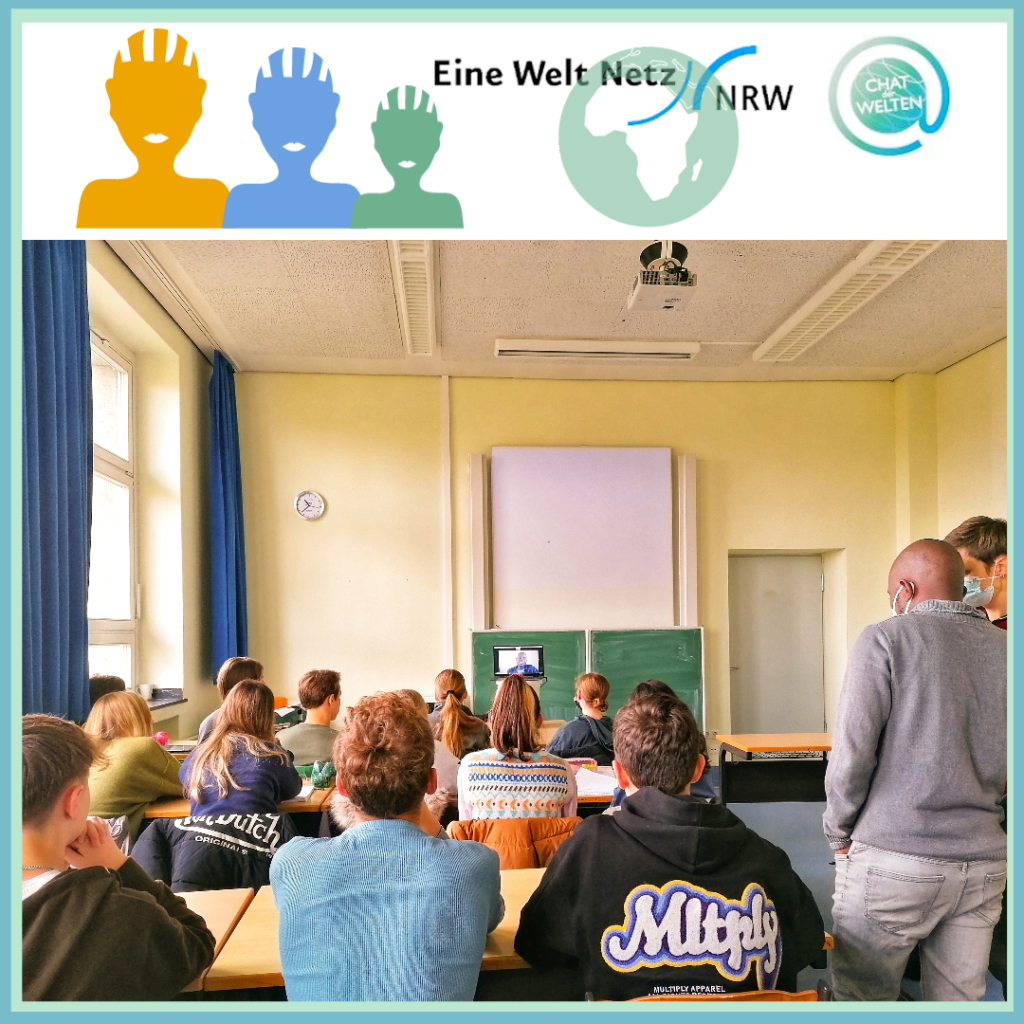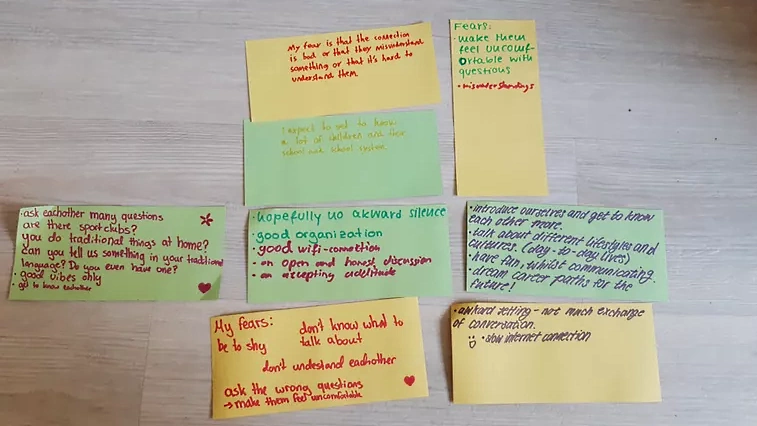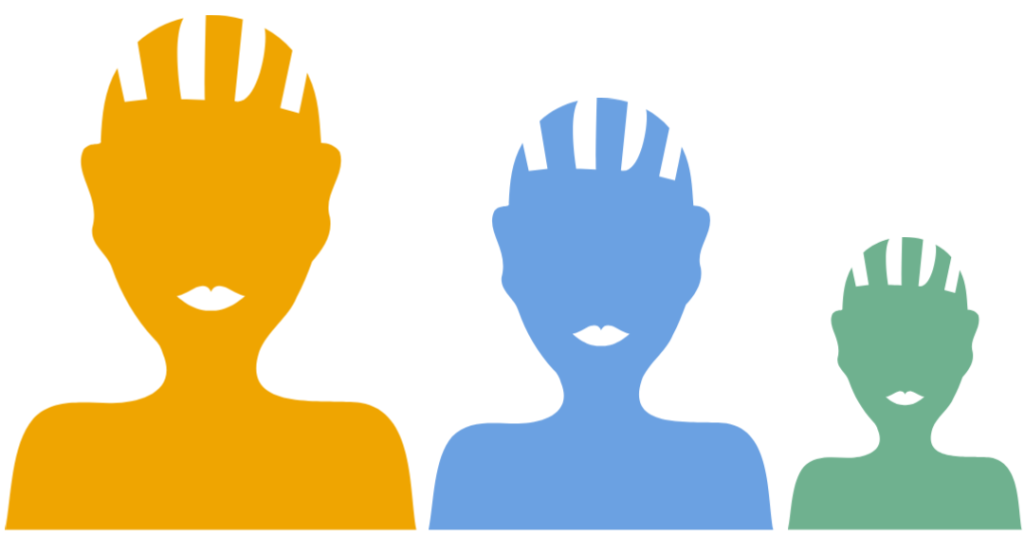
Mit Chat der Welten hatten unsere Schülerinnen und Schüler der Jgst. 9 im Oktober und November 2022 die Möglichkeit, sich online mit der Gulu Central High School in Uganda über das Thema Geschlechter-Gerechtigkeit auszutauschen. Zwei live-Sessions mit Gleichaltrigen und eine weitere Videokonferenz mit Lehrer Solomon Rackara waren möglich, bevor Anfang Dezember die ugandischen Schulen aufgrund eines Ebola-Ausbruchs früher als geplant in die Weihnachtsferien gingen. Die schwache Internetverbindung machte es manchmal nötig zu improvisieren und mit nur einem Gerät mit integrierter Kamera zu arbeiten, aber zum Glück kamen am Ende doch Gruppendiskussionen in Breakout-Rooms zustande.
Mit Workshop-Leiter Bongani Makhubela aus Südafrika erarbeiteten die Schülerinnen und Schüler zunächst Regeln für eine faire Kommunikation und tauschten sich in Gruppen über ihre Erwartungen aus. Auch Sorgen wurden formuliert. ‘What if we make them feel uncomfortable?’, ‘What if we do not understand each other or if there is awkward silence?’.

Als nächstes drehten die Schülerinnen und Schüler Mini-Videos, um sich gegenseitig vorzustellen und den Partnern über ihre Schule und das Lernen in ihren jeweiligen Ländern zu berichten.
Beim ersten Online-Treffen stellte sich heraus, dass die Jugendlichen mehr gemeinsam hatten als anfangs gedacht:
“After all these chats I realised that the Ugandan students and we are not so different. We have almost the same daily routine, the same hobbies and the same favourite subjects.” (Joshua, Year 9)
Nach und nach wurden aber auch Unterschiede deutlich:
“For me, the online project with the Ugandan students was absolutely wonderful! Seeing them for the first time was so exciting and getting to know them more was even better. The first time we had a video call with them, we basically just introduced ourselves. I found it fascinating to see how similar our daily lives were. Most of us like sports, some of us are interested in art and there were so many more mutual hobbies between us. Something else that caught my eye were their answers to our questions. Whenever we asked them a question, for example about gender roles or stereotypes, they always answered with long sentences and I found that very interesting because you could easily imagine what it’s like in Uganda without actually being there.” (Arshida, Year 9)
“When we discussed our hobbies, we noticed they were quite similar. A lot of kids in Uganda and our class were for example interested in football, chess and acting. But when we got into the more complex topics, like homosexuality, I noticed how different the two countries are. We did not get a chance to talk to them about LGBTIQ, because it would have been dangerous for the students and the teachers. Although this was unfortunate, it taught me something about this topic. It showed me how something which is normal in our German society can be handled completely differently in another. (Greta, Year 9)
Mit Workshop-Leiterin Kathrin Schilbach erarbeiteten die Schüler anschließend Chimamanda Adichies Ted Talk über “The Danger of a Single Story”.
“With Kathrin, we watched a video by Chimamanda Adichie, a Nigerian writer. Before I heard her speech, I had never thought African children could think it impossible to write books about them, because of the many books about white children. I´ve also never thought about the “single story problem” she had when she came to the US. Everyone thought she was uneducated and poor, while she had actually had a nice childhood. The people don’t know enough about a person or culture and still think they know someone because of the stereotypes they have.
All in all, it was such a nice and educating project; I could have never imagined learning so much and having a completely new view on Uganda. When I heard about this project, I had all those stereotypes in mind which are wrong, and I am glad I have had the privilege to talk to the Ugandan students and notice where I was wrong.” (Eva, Year 9)
Weitere Schüler-Fazits zum Workshop:
“I really did learn a lot and it made me think about other cultures and also about the dangers of a single story because I realised that I also had or maybe still have a lot of single stories and prejudices about other countries. But now I am able to do something against those ideas hardening into stereotypes or prejudices.” (Tonia, Year 9)
“Through this project I learned how lucky we are to live in a state with rule of law, because in Uganda not everyone is the same in court. Homosexuality is illegal in Uganda and the Ugandan teacher was worried to get punished, because he talked about this with us. Furthermore, I liked to talk about and debunk stereotypes about Germany and Uganda, because it is interesting to know what other cultures think about each other.” (Johann, Year 9)
“After this project I realised how privileged we are. I have rights and my own voice, I am eligible to vote and I don’t have to marry if I don’t want to. This project made me realize that there is a lot more gender inequality than I thought in this world. I feel like every school and class should be doing a project like this so that we can find a solution for stereotypes, gender issues and gender inequality.” (Amalia, Year 9)

Wir danken dem Verein der Freunde und Förderer der Goetheschule Essen für die finanzielle Unterstützung bei der Umsetzung dieses Projekts.
